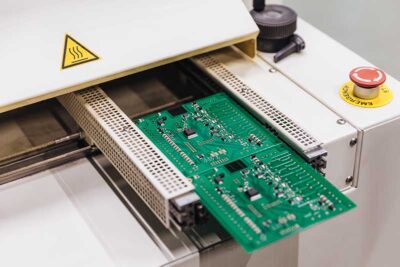 Depending on the type of business you operate, you might not think that the global supply chain issues surrounding the semiconductor industry impacts the ongoing success of your organization. However, nearly every business on earth depends significantly on semiconductor manufacturing for everything from communications to computers, as well as many of the tools that we use to conduct business on a daily basis. While there are many companies and governments working to build new plants and create policies to aid in the global chip shortage, it is still a race to determine whether or not they will be successful. What began in early 2020, due in part to the impact of the COVID-19 pandemic, has continued to be a thorn in the side of many manufacturers and corporations worldwide.
Depending on the type of business you operate, you might not think that the global supply chain issues surrounding the semiconductor industry impacts the ongoing success of your organization. However, nearly every business on earth depends significantly on semiconductor manufacturing for everything from communications to computers, as well as many of the tools that we use to conduct business on a daily basis. While there are many companies and governments working to build new plants and create policies to aid in the global chip shortage, it is still a race to determine whether or not they will be successful. What began in early 2020, due in part to the impact of the COVID-19 pandemic, has continued to be a thorn in the side of many manufacturers and corporations worldwide.
Why Microchips Are So Important
You might not realize it, but nearly every single digital electronic device used today is powered to some degree by semiconductors. The semiconductor industry creates integrated circuits, which are commonly known as microchips. The global chip shortage means that it is much harder to procure the materials necessary to build devices that process information, such as computers, smartphones, video games, and high-tech industrial equipment. Depending on the type of chip that is needed, it can take a long time to produce, due to their complexity. Some chips can take six months or more to create, requiring additional facilities and factories to keep up with the demand.
Political issues have impacted semiconductor manufacturing, specifically trade wars between Japan, Korea, China and the United States. These trade wars drove up commodity pricing and distribution, even without the influence of the pandemic and other issues. Natural disasters have also played a role, including drought conditions in Taiwan, which is where a majority of microchips in the world are made, and three plant fires in Japan, which impacted raw materials shortages for the industry. Demand changes for chips within the automotive industry along saw a drop in production and then a quick increase again just a few years later. Increased interest in IoT technologies, as well as advancements in AI, have also put further strain on the global supply chain for microchips.
Which Industries Suffered the Most?
While it can be said that every business around the globe has been impacted to some degree by the semiconductor manufacturing issues, some industries were hurt more than others. One example is consumer electronics, which includes smartphones, televisions, cameras, gaming consoles, laptops, and more. This industry has always heavily depended on the semiconductor industry to create home appliances, personal computers, and mobile devices. As a result, prices increased for the end user due to the global chip shortage, which significantly impacted sales. Demand is still high for these devices, but consumers are being more selective about the products they are purchasing, due in part to the increased cost.
Some industry insiders believe that new and expanding technologies, such as Artificial Intelligence (AI), could have stunted growth due to the global chip shortage. The AI and GPUs required for this technology require a special type of chip that is used to teach and deploy AI services and products. While demand for more AI is growing, manufacturers are having a hard time keeping up due in large part to the global supply chain issues. Standard chips are increasingly difficult to obtain, and these specialized and more costly versions are primarily made at one single manufacturing plant by Nvidia in Taiwan. A downturn economy means less spending by consumers, reducing the amount of capital that these developing businesses have available to invest.
What Can You Do?
Business owners need to be ready to adapt to changes posed by any type of global supply chain issue, so the global chip shortage needs to be treated as such. Investments in new technology, whether that means computers and peripherals for office staff or equipment and supplies for manufacturing, needs to be evaluated carefully before moving forward. Working with a team of innovative technology consultants can be helpful, especially when it comes to upgrading or increasing in-house technology. If you are concerned about how semiconductor manufacturing issues might impact your business and are looking for alternate solutions to achieve your goals, contact Synivate by calling 617-517-0704 and speak with one of our friendly and helpful customer service agents. Together we can navigate the challenges posed by global supply chain issues that impact today’s technology-based businesses.
